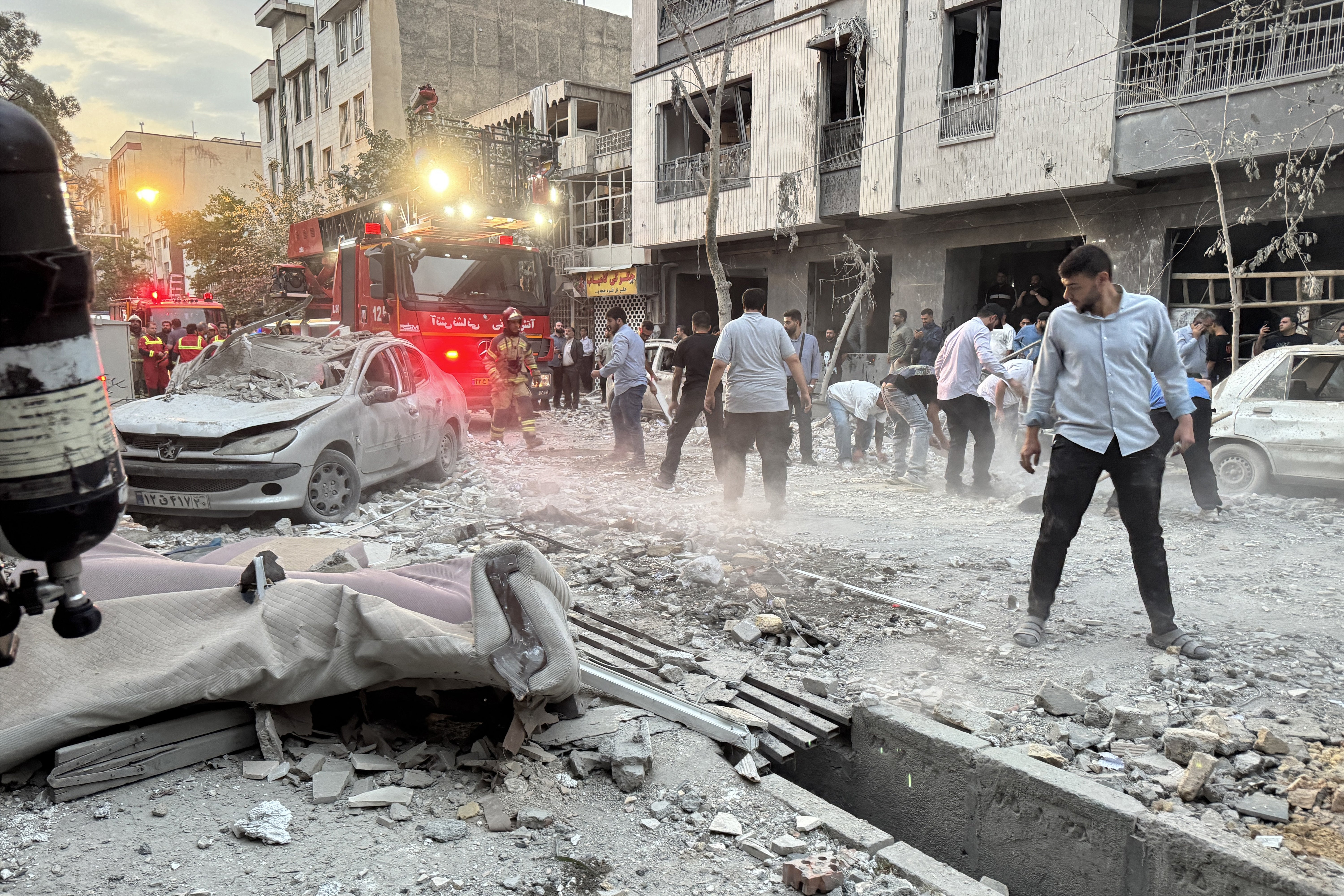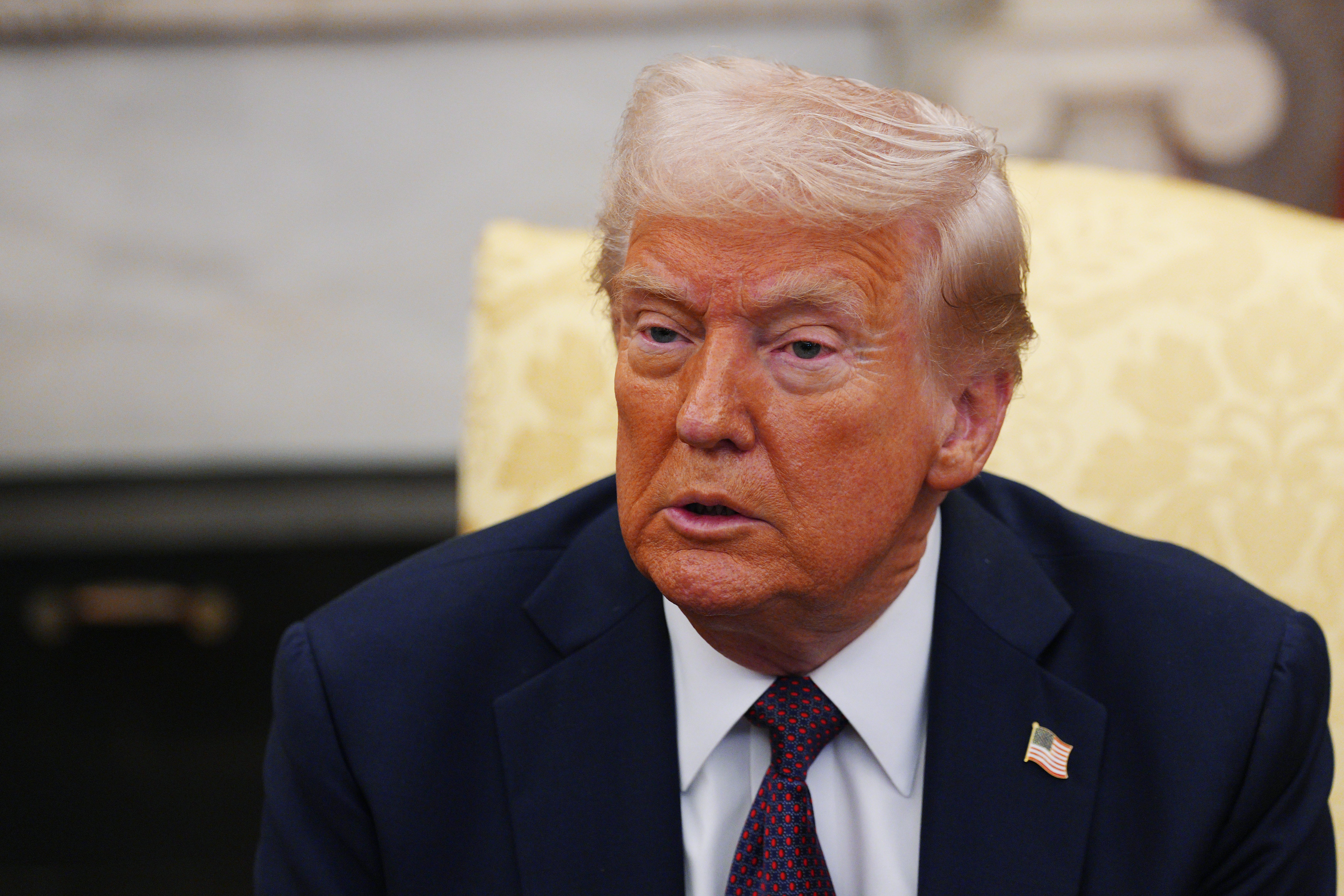Donald Trump has warned Iran to make a nuclear deal or face “slaughter” as fears of all-out war in the Middle East grow.
Benjamin Netanyahu launched “Operation Rising Lion” in the early hours of Friday morning with an attack on Tehran’s nuclear facilities and military commanders.
Israel said around 200 Israeli Air Force aircraft dropped 330 munitions on around 100 targets in total, which included ballistic missile factories. In all, at least 20 senior commanders were killed, two regional sources said, reportedly including the head of the Revolutionary Guards aerospace force.
Iran warned “the gates of hell will open” in retaliation, while Israel said the strikes were only the start of its campaign as tensions in the region reach boiling point.

The US president issued a stark warning to Tehran while also indicating there was still time to avert further attacks.
“I gave Iran chance after chance to make a deal," he said on Friday. “There has already been great death and destruction, but there is still time to make this slaughter, with the next already planned attacks being even more brutal, come to an end. Iran must make a deal, before there is nothing left.”
Britain and the US both denied any involvement in Israel’s attack. But while Sir Keir Starmer convened an emergency Cobra meeting and urged restraint, Mr Trump labelled the attack “excellent” and said Washington had been informed beforehand.
“We gave them a chance [to strike a nuclear deal] and they didn’t take it,” said the US president, who in 2018 pulled out of a deal struck with Iran by his predecessor Barack Obama. “They got hit hard, very hard. They got hit about as hard as you’re going to get hit. And there's more to come. A lot more.
“We knew everything, and I tried to save Iran humiliation and death,” he said. “I tried to save them very hard because I would have loved to have seen a deal worked out. They can still work out a deal however, it’s not too late.”
.png)
Tehran was among six cities struck in the overnight attack, which Iran said killed six nuclear scientists and several top commanders, including Hossein Salami, the head of Iran’s Revolutionary Guards, along with Mohammad Bagheri, the chief of staff of Iran’s armed forces, and the army’s deputy commander in chief, Gholamali Rashid.
Mossad operatives situated deep within Iranian territory also conducted a series of covert sabotage missions targeting the country’s air defence systems. This involved building a drone base near Tehran, a security source told the Times of Israel.
Israel has made clear its intentions to wipe out Iran’s nuclear capability, with Mr Trump previously warning they “cannot get a nuclear weapon”. While Iran insists its nuclear programme is intended merely for energy purposes, Tehran’s leadership has repeatedly called Israel a “cancer” in the Middle East.
The Israeli military claimed on Friday it had been forced to act by new intelligence information showing that Iran was “approaching the point of no return” in the development of a nuclear weapon.
But a source familiar with US intelligence reports said there had been no recent change in Washington’s assessment that Iran was not building a nuclear weapon and that Ayatollah Ali Khamenei had not authorised a resumption of the nuclear weapons programme that was shut in 2003.
As Iran retaliated with a salvo of 100 drones, Jordan’s military said it had intercepted a number of missiles and drones that entered its airspace and which had been likely to fall in Jordanian territory, including populated areas.

As sirens reportedly sounded in Amman, civilians on the ground in Baghdad told The Independent that they initially believed Iraq was under attack as they heard explosions overnight.
Iran’s main nuclear enrichment facility in Natanz was damaged in the overnight attack, but investigations have not shown any radioactive or chemical contamination outside the site, the country’s atomic energy organisation said.
“I woke up to deafening explosion. People on my street rushed out of their homes in panic, we were all terrified,” said Marziyeh, a 39-year-old from Natanz. Explosions were also reported in Tehran and other cities including Bandar Abbas, Arak, Isfahan and Kermanshah.
Despite strikes being reported in Isfahan, the International Atomic Energy Agency said that Iran’s nuclear facilities there had not been impacted, citing Iranian officials.
But the UN’s nuclear watchdog warned that any military action jeopardising the safety and security of nuclear facilities risks grave consequences for the people of Iran, the region, and beyond.
Further Israeli strikes were reported on Friday, including at Iran’s military airport in Tabriz and at the Shia holy city of Qom, according to Iran’s semi-official Mehr news agency.

Tensions in the region were already ramped up after 20 months of war in Gaza, sparked by Iranian-backed Hamas’s attack on Israel on 7 October 2023. Over that period, Israel has also severely wounded Iran’s powerful Lebanese ally Hezbollah, while trading fire with the Houthis in Yemen, who had been targeting Gulf shipping in retaliation for the Gaza war.
However, Israel’s major escalation will raise fears of all-out conflict between the region’s most powerful militaries and a destabilising wider escalation, with concerns that US military sites and shipping in the Persian Gulf could become targets.
Iran’s defence minister Aziz Nasirzadeh had warned on Wednesday that it would retaliate by hitting US bases in the region if Iran was subjected to strikes. The US has a military presence at bases across the Middle East.
In an acknowledgement of the heightened risk, the US on Wednesday announced the partial closure of its embassy in Baghdad, while authorising the “voluntary departure” of military dependents from bases in Bahrain and Kuwait.
Also on Wednesday, the UK’s maritime agency warned that increased tensions in the Middle East may lead to an escalation in military activity that could impact shipping in critical waterways. It advised vessels to use caution while travelling through the Gulf, the Gulf of Oman and the Straits of Hormuz, which all border Iran.
While Hezbollah indicated on Friday that it would not respond to Israel’s attack on Iran, the Tehran-allied regime of Bashar al-Assad in Syria has also been toppled since Iran’s major attack on Israel last April.
However, there are fears that Iran-aligned paramilitaries in Syria could use this moment to attack Israel and derail the rebirth sought by the nascent rebel-led administration established after the fall of Assad December.
Additional reporting by Reuters
How Iran’s military can wreak cold, bloody revenge on Israel
LA protests live updates: US Marines land in Los Angeles to join National Guard
Israel-Iran latest: Iran launches ballistic missiles at Tel Aviv
Starmer and Trump call for ‘diplomacy and dialogue’ in Israel and Iran conflict
Why Israel and Iran’s escalation is unprecedented for a teetering Middle East
Oil prices jump after Israel’s attack on Iran and it could lead to higher gas costs







